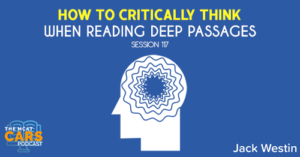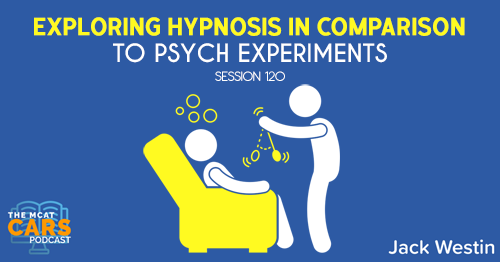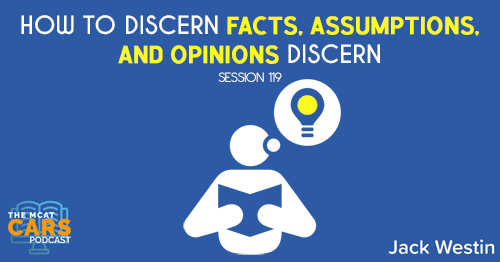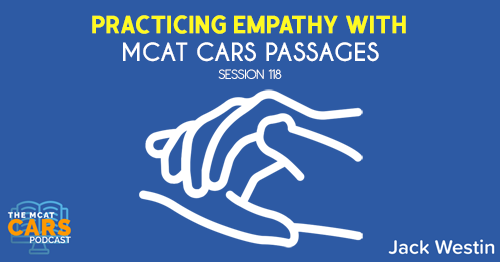Apple Podcast | Google Podcast
Session 117
MCAT passages are all about giving a message. You don’t have to understand everything, but you can’t just assume or predict things that aren’t there.
As always, I’m joined by Jack Westin from JackWestin.com. Check out all their amazing free resources including a free trial session of Jack’s full course to see how it’s like learning from Jack Westin himself.
Listen to this podcast episode with the player above, or keep reading for the highlights and takeaway points.
Link to the article:
https://www.commonwealmagazine.org/roots-reality
I have thought a lot about a concept I call rootedness, which seems to me a fundamental human need. Being rooted in something—whether a community, a faith, a set of traditions, a philosophy, or a devotion to a particular activity—is a way of forming an identity, of telling others, but mostly ourselves, who we are. Rootedness gives us a way of orienting ourselves in the world, of navigating the challenges we face by locating ourselves vis-à-vis the phenomena we encounter. For example, a Christian is a person rooted in the teachings of Jesus; a devout Christian decides whether to participate in a given activity—going to a particular movie, say—according to whether or not that activity aligns with his or her beliefs. Being a Christian is one way of being rooted, and being rooted makes it easier to live in the world.
Rootedness, then, is a good thing. However, it comes with some drawbacks. Chief among those is that when we must decide either to hold tight to the ways we are rooted or to believe the reality in front of our faces, most of us choose our own rootedness, explaining away reality as best we can. This is, of course, very understandable. Our identities, our sense of ourselves, are bound up in the ways we are rooted. To go against that is to risk losing our sense of who we are, and that is a truly frightening proposition. To avoid doing that, we will tell ourselves nearly anything.
Many Americans, because of the way they are brought up and educated, are rooted in the belief that the United States of America is beyond reproach. The Founding Fathers, those godlike men, established a nation based on the unassailable ideal of freedom. That is what the nation was at its birth, that is what it remains, and that is the end of the story—except in the minds of those who are dismissed as anti-American, a label slapped on anyone who criticizes any aspect of American life. Those people who are rooted in the idea of America’s irreproachability are unable to confront the nation’s problems—like racism and a broken political system—because those people’s sense of themselves will not allow them to admit that such problems exist. Their desire to preserve their rootedness is in part what drives them to support a president who reaffirms their beliefs, however catastrophically he may otherwise fail as a leader. The more that president is criticized, the more those supporters embrace him, perhaps less out of belief in the president himself than out of a desire to hold tight to their roots.
One look at America’s history will reveal both the nation’s greatness and its monumental flaws. I believe in the truth of both, and I write this as a Black American, one whose ancestors were human beings owned by other human beings. I feel anger at the historical treatment of generations of Blacks; I also feel pride in what those generations of Blacks have nonetheless contributed to this nation, in terms of both culture and sweat. I acknowledge the genius at work in the writing of the Declaration of Independence and the U.S. Constitution. I also acknowledge that genius does not equal perfection, that the Founding Fathers were flawed men who were unable to resolve America’s fundamental contradiction: that the nation ostensibly founded on freedom was actually built on slavery. American history has been a long, fitful, sometimes successful attempt to make the nation’s reality match its ideals, an attempt that has met with resistance at every step. Those ideals, and the attempt to meet them, are what make America great.
[01:54] General Tips
When it comes to critical thinking, you really don’t have to do much for reading because it’s really done at the question level. So whenever you get lost in the details and all the different things they say, find the North Star in every paragraph. There’s probably a big point.
“If you stick to those big points and not get lost in those little details, then you're going to be okay.”Click To Tweet[02:55] Paragraph 1, Sentence 1
I have thought a lot about a concept I call rootedness, which seems to me a fundamental human need.
Jack says:
'You're going to see a passage you're not going to like, or at least you think is hard, but maybe it's not that bad.'Click To TweetEven if this seems like a hard one, go in with this curious attitude, and this sense of appreciation for whatever the message you’re about to learn. Because maybe you’ll actually enjoy the experience of reading this passage.
So far, we don’t know what rootedness is. But it does say it’s a fundamental human need. And that’s all we need. You do not need a background history on this. You do not need to have taken a class on this. That’s not necessary. Whatever is in front of you is what’s important here.
[04:12] Paragraph 1, Sentence 2
Being rooted in something—whether a community, a faith, a set of traditions, a philosophy, or a devotion to a particular activity—is a way of forming an identity, of telling others, but mostly ourselves, who we are.
Jack says:
So now, we understand that rootedness is a way of forming an identity of telling others but mostly ourselves who we are. And that’s the fundamental human need – this sense of identity. The author doesn’t say that directly. But that’s a very strong assumption that identity is a fundamental human need.
[04:54] Paragraph 1, Sentence 3
Rootedness gives us a way of orienting ourselves in the world, of navigating the challenges we face by locating ourselves vis-à-vis the phenomena we encounter.
Jack says:
So this is just more of an explanation of rootedness as a way of orienting ourselves in the world where you make decisions based on that identity. One example is whether you’re Republican or Democrat. If you’re a Democrat, you tend to just vote for the person on the party ticket. Yep. So you probably don’t vote for a democratic president. That’s not always the case. There are different factors that could change the way you look at this. But ultimately, we tend to side with whatever group we identify with.
[06:45] Paragraph 1, Sentence 4
For example, a Christian is a person rooted in the teachings of Jesus; a devout Christian decides whether to participate in a given activity—going to a particular movie, say—according to whether or not that activity aligns with his or her beliefs.
Jack says:
So if you’re maybe a devout Christian, you probably won’t go watch movies that are too sexual or too violent in nature. Usually, when the MCAT gives you an idea, they’ll give you an example that clears it up. Hopefully, this was enough.
[07:40] Paragraph 1, Sentence 5
Being a Christian is one way of being rooted, and being rooted makes it easier to live in the world.
Jack says:
This is such a huge opinion. And you may not agree with this. Because most students will read this and take this as a fact. But this is not a fact. Just because you’re rooted in something does not make your life easier. Maybe it does, maybe it doesn’t. So we are just reading someone’s point of view.
[08:46] Paragraph 2, Sentence 1
Rootedness, then, is a good thing.
Jack says:
The author here basically saying if being rooted makes it easier to live in the world, then rootedness must be a good thing.
[09:03] Paragraph 2, Sentence 2
However, it comes with some drawbacks.
Jack says:
Even though the author says it has drawbacks, which means it has problems, the author overall believes it’s good. So it’s interesting where the author is going to be more focused on as we go through the rest of this passage – the drawbacks or the good stuff.
Just because we’re talking about the bad parts of this rootedness idea does not mean that the author thinks it’s bad overall.
Understanding where the author lies in an argument can help you get a lot of questions. Some students who read the question would assume the author doesn’t like it because it has some drawbacks. But that’s too strong of a conclusion.
'It's not always black or white, there's always that gray area. And we can try to understand those gray area details that will help us answer these questions.'Click To Tweet[10:53] Paragraph 2, Sentence 3
Chief among those is that when we must decide either to hold tight to the ways we are rooted or to believe the reality in front of our faces, most of us choose our own rootedness, explaining away reality as best we can.
Jack says:
This explains a lot of our current world with polarization. We’re rooted in our beliefs and we don’t care about what reality shows us. This is the drawback the author is saying that it can hurt our sense of reality. So we may be wrong about something even though we side with that rootedness.
[11:38] Paragraph 2, Sentence 4
This is, of course, very understandable.
Jack says:
The author here is sympathetic with those who explain away reality saying it’s understandable.
[11:49] Paragraph 2, Sentence 5
Our identities, our sense of ourselves, are bound up in the ways we are rooted.
Jack says:
The author is just explaining why it’s understandable.
[12:04] Paragraph 2, Sentence 6
To go against that is to risk losing our sense of who we are, and that is a truly frightening proposition.
Jack says:
So the author is saying if we do change your actions, it seems like the author thinks we actually hurt our rootedness, our identity. That’s an interesting point that if you do something against your rootedness, it hurts how rooted you really are.
[12:37] Paragraph 2, Sentence 7
To avoid doing that, we will tell ourselves nearly anything.
Jack says:
So we tell ourselves anything to avoid losing our identity.
[12:55] Paragraph 3, Sentence 1
Many Americans, because of the way they are brought up and educated, are rooted in the belief that the United States of America is beyond reproach.
Jack says:
Maybe you don’t know what “reproach” means but you can assume that the United States is the best so we can’t do anything wrong. And we got that because we understood the previous paragraph.
Being beyond reproach means you can’t blame it. Reproach actually means blame. So you are not capable of blaming the U.S. because the U.S. is perfect. And because we’re Americans, we side with whatever America does, even if America makes mistakes.
[13:53] Paragraph 3, Sentence 2
The Founding Fathers, those godlike men, established a nation based on the unassailable ideal of freedom.
Jack says:
If you’re in elementary school, they’ll teach you the Presidents’ names. And as to why they put such emphasis on people that may be flawed, maybe because it allows you to respect authority. And it’s important to respect authority, especially while you’re growing up.
We all know that America is not perfect and that’s why we’ve been progressing towards more and more civil rights. It’s now changing the way we look at things.
[15:46] Paragraph 3, Sentence 3
That is what the nation was at its birth, that is what it remains, and that is the end of the story—except in the minds of those who are dismissed as anti-American, a label slapped on anyone who criticizes any aspect of American life.
Jack says:
This is a sarcastic explanation as to how others, not the author, approach America when they’re deeply rooted and aren’t willing to change their opinions. For instance, whatever the nation did at birth is perfect. And if you question it, you are dismissed as anti-American.
Hopefully, students understand the way the author has injected this opinion. Don’t get lost in the details. Think about the bigger picture. The bigger picture is that people are rooted. And rootedness can let them lose sense of reality. It’s all based on that. So everything you’re reading here fits into that. You don’t have to make new things up and you can just put this under that umbrella or that basket.
[17:38] Paragraph 3, Sentence 4
Those people who are rooted in the idea of America’s irreproachability are unable to confront the nation’s problems—like racism and a broken political system—because those people’s sense of themselves will not allow them to admit that such problems exist.
Jack says:
Especially in 2020, when we talk about systemic racism, people who are rooted in the fact that America is number one will go “that can’t be” because America is number one.
[18:12] Paragraph 3, Sentence 5
Their desire to preserve their rootedness is in part what drives them to support a president who reaffirms their beliefs, however catastrophically he may otherwise fail as a leader.
Jack says:
The author stops short of mentioning any specific president and generally mentions leaders. Because this happens in every country, at some point in their history. We believe in someone so much that we’ll just go along with whatever they do.
The author who wrote this is smart enough to realize that we all have opinions about Trump or whoever, and they just want to get their point across. Maybe the author is hoping we can use this information to better apply it to our day to day lives, which includes whichever president or leader you want.
[19:35] Paragraph 3, Sentence 6
The more that president is criticized, the more those supporters embrace him, perhaps less out of belief in the president himself than out of a desire to hold tight to their roots.
Jack says:
Maybe all of these divisive kinds of things happening in our world are because of some identity. Maybe if we don’t identify as Republican or Democrat, then maybe that could change the atmosphere. Maybe that allows us to see how the person we’re supporting whether you’re Democrat or Republican isn’t always correct. And that maybe that allows us to become more sympathetic towards the other person.
[20:52] Paragraph 4, Sentence 1
One look at America’s history will reveal both the nation’s greatness and its monumental flaws.
Jack says:
The author is pointing out that America has lots of greatness and it has flaws.
[21:06] Paragraph 4, Sentence 2
I believe in the truth of both, and I write this as a Black American, one whose ancestors were human beings owned by other human beings.
Jack says:
Now, we’re given some context into who this author is now, a Black American, whose ancestors were slaves and were enslaved by white Americans. And they’re just looking at the greatness and flaws.
This is a very important sentence right now because of how the author brings up who they are, but because they tell us what they believe. Now, I always want to look out for that. It says, “I believe in the truth of both.” And we’ve been saying that all along. You can still think rudeness is good. But you can also still think that there are some parts to rudeness that are bad. And the author is just using their own experience.
[22:03] Paragraph 4, Sentence 3
I feel anger at the historical treatment of generations of Blacks; I also feel pride in what those generations of Blacks have nonetheless contributed to this nation, in terms of both culture and sweat.
Jack says:
The author is giving examples of the greatness and flaws.
[22:26] Paragraph 4, Sentence 4
I acknowledge the genius at work in the writing of the Declaration of Independence and the U.S. Constitution.
Jack says:
So, the author is going back to those godlike men that we talked about earlier, as well as the Constitution and the Declaration of Independence.
[22:43] Paragraph 4, Sentence 5
I also acknowledge that genius does not equal perfection, that the Founding Fathers were flawed men who were unable to resolve America’s fundamental contradiction: that the nation ostensibly founded on freedom was actually built on slavery.
Jack says:
“Genius does not equal perfection.” – that’s a very profound and important statement. Just because you’re good or you believe in someone or you think they did great things, doesn’t mean that everything they have done is great. That’s very hard for people to wrap their heads around. And that’s the problem the author is trying to point out with rootedness.
[23:43] Paragraph 4, Sentence 6
American history has been a long, fitful, sometimes successful attempt to make the nation’s reality match its ideals, an attempt that has met with resistance at every step.
Jack says:
Our ideal is that everyone is free and we’re all equal. But that’s not necessarily the reality. And when we try to get reality, it’s met with resistance. So this shows that problem.
[24:17] Paragraph 4, Sentence 7
Those ideals, and the attempt to meet them, are what make America great.
Jack says:
It’s not necessarily that we are the greatest, but the attempt to to live up to greatness is what makes us great.
[24:38] Main Idea
This is what these MCAT passages are all about. They’re trying to give you a message more profound than others that we’ve ever read. But regardless, there will be questions about the author’s attitude towards America. It would be wrong to say it’s negative and it would also be wrong to say it’s positive. Because it’s somewhere in the middle. It’s kind of ambivalent.
Knowing how the author argues things and how all these different sentences fit in with everything will give you a better idea of what they’re going to ask and how to answer those questions.
You’re going to get articles that are harder to read, not because they’re trying to challenge you. But because it was written in a different time period when English was very different than it is now.
“You don't have to have a full 100% understanding of everything. But you can't make drastic mistakes.”Click To TweetSo if you are not careful with how they say things, you may make mistakes. You can’t just assume things that aren’t there. You can’t predict things that aren’t there and stick to them. And that takes a lot of practice.
Links:
Link to the article:
SEARCH SITE
SEARCH SITE
LISTEN FOR FREE












